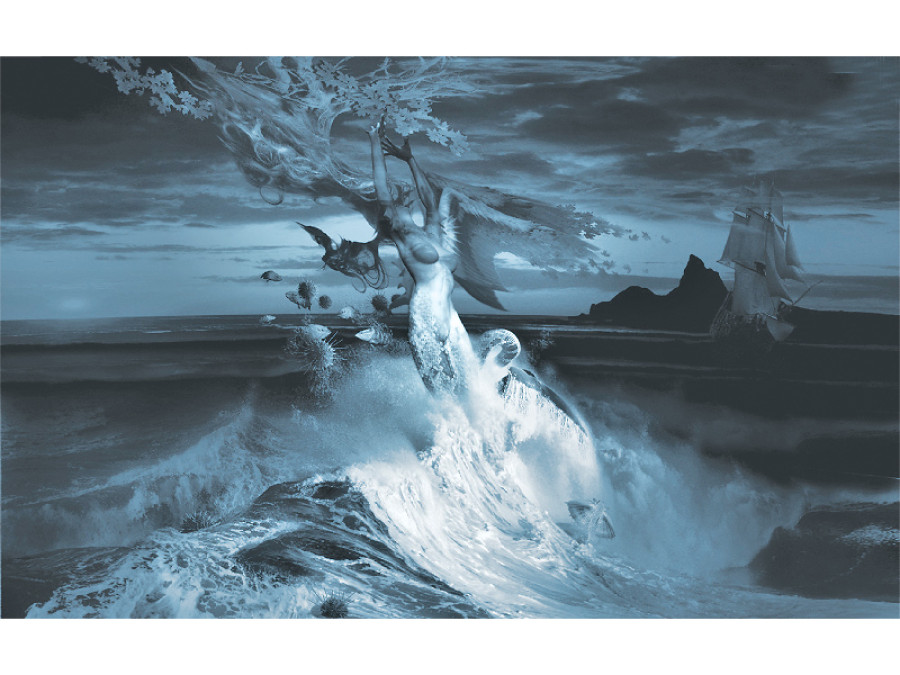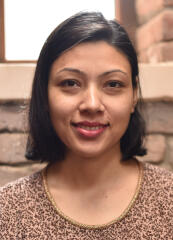Fiction Park
In my deathbed
After I’m gone, there will be a vacant bed, a vacant wardrobe. But they will soon be filled up with another sleeping line and books and accessories
Barsha Chitrakar
Many years ago, they told me I was going to die. Six months, they said. I outlived that. I actually outlived decades. There were times when I felt I had won over death. You could say, I felt immortal. I mean, what would you call a person who had
transcended death, or rather the intransigent nature of death? Not that I took pride in being an immortal. It came with a price. And prices I’ve paid in many occasions.
When I was 77, they put me in a nicely made chariot to mark my approaching to centenary. The chariot was adorned with paper hangings—pink, green and yellow. My daughters put on things on my face—red and white—things I never dared put on my sparkling face. You’ll look like a bride, aama, they exclaimed. I looked beautiful, I was sure. Red had been aloof to me for quite a while. As they draped me in a red sari, I sat smiling; I was enchanted, and was enchanting everyone around. All my favourite people came to see me in red, the divine me, the immortal me! There was a small feast followed by laughter. Had the doctors who had given me the death ultimatum been there, I would have laughed at their faces. But they weren’t there. I met them a few years later however.
I was never fond of these doctors. Once I cut my toe when I was a kid. The rebel that I was, I didn’t fathom my mother’s warnings. Stay out of the sickle, she had shouted. And the next thing I know, the sickle ran deep through my toe. The doctor managed to stop the bleeding. But I will never forget the stare he’d given me as I began to cry with pain. I had to gulp down the pain—the way you’d gulp down something nasty. I had decided there and then that even in my
deathbed I’d refuse to see him. I don’t think he’s here. But then I don’t really remember his face. All I remember are blur lines; ovals and circles. If you reduce human faces to basic shapes—circles, rectangles and ovals—then everyone would look the same, standing lines, sleping rectangles.
I can hear all these noises made by the standing lines and rectangles. They wouldn’t shut up, of course. Keeping quiet would be the last thing on their minds. I had been called names for being loud. I too have shouted names at people. There was this doctor who had to bear the wrath of my calling names only recently. Not that I regret it—not after what he did to me. The idiot didn’t even have the slightest idea to check the vein properly before injecting his bloody needle. Ahhh… it cut through my skin in search of my bloody vein. He had to pierce the needle thrice through the maze of my old veins until it finally got hold of the red liquid. Bemaan! I had shouted in my somber sleep. He got his lesson, I believe.
You’d think I should recount my beautiful yesteryears now that death has gotten a good part of me. Don’t even start with me with your ‘death is inevitable’ lecture. Knowing this inevitable crap is one thing, living with it is something else altogether. Yes, I’m old. But that’s no reason for one to die. I remember reading
obituaries that callously mention just the age of the deceased and a long list of those who are mourning. Then there are a few obituaries, the few decent ones I would add, that manage to project the deceased a little more than just his age. A number, too little words and a family tree—this is what you’ll get reduced to eventually. Never mind the long hours you spend on that project or the number of holes they jabbed on your body to get some tubes fixed or the countless sneezes you held back while carrying your granddaughter—in the end these things aren’t remembered.
Thirty-five words, this is what my late husband was worth in the end. Don’t make it more than 35 words, please, I told my elder son the other day. He only gave me a look that said, nonsense again, aama. They think I talk a lot of nonsense these days. I don’t know how my asking about my long-lost friend can be any nonsense. A friend came to visit me a few months back, she told me about Nani Miaya. I had no idea Nani Maiya had died all those years ago. How we used to play and hide candies in the hem of our frocks. Then there was her brother who had married a girl from another caste and was thus left to fend on his own. Call him and feed him something—he must have been hungry for a long long time. Call him, I shouted at my daughters. All I got was their exasperated looks that clearly said, nonsense again, aama. Sometimes I think I am full of nonsense. There were days when I was full of energy and love, when I bred joy and smiles. Now all that’s left of me is nonsense, gibberish talks and exasperated looks.
Nani Maiya had died while I had lived. I had lived to witness the clear blue water of the nearby pond turn into murky liquid. I had lived to witness the exterior plaster of my neighbour’s house peel off layer by layer. I had lived to witness the head of a monkey idol of my chowk being shipped off to someone’s leather bag and wall. I had lived to resonate the sounds of baaja year after year. On that chariot-riding day to mark my divinity, there was a small band of musicians, who, for my love of traditional music, played traditional instruments. As they played, I became so sure of my immortality. I mean, I had defeated my own death predicament in the first place. And now I was being revered as divine. The music somehow transfused a new life into me. I felt my consciousness regaining, my spirits alight, something akin to a phoenix. I felt everything anew. In less than a year, I was bed-ridden. So much for the musical conundrum! Immortality then became synonymous to being bed-ridden, being fed by tubes and reminiscing glimpses from another era. My consciousness then took a leap back and held me at a place where there were clear waters, monkey idols and Nani Maiya.
The doctor I shouted at earlier is here for another round. He asks me to open my eyes. What for, I want to ask him. I’m tired of looking at the
same rectangles and ovals. Then there’s another series of piercing and jabbing. My grandchildren ask me to sing a song, a lullaby they would sleep off to when they were so small that they fit in my small lap. I mutter a few words. I’m out of tune, I know. But they listen to it as if it’s their favourite song. I wish I could imprint the tune in their hearts. My favourite people come to see me. They tell me things, things I just can’t make out. They keep speaking, words after words. But every syllable they utter gets drowned like a ray of light in the black hole. The doctor comes again for his round of procedures, then some more of my favourite people. I wish Nani Maiya would come too.
I know I’m not immortal. I know I’m going to die in this deathbed. They can make as many holes in my body, fix as many tubes and adorn as many chariots, but die I will. My old man knew this too well. Nani Maiya knew this too well. I might as well try to grasp this part of mortal life. I’ve lived far too long anyway. After I’m gone, there will be a vacant bed, a vacant wardrobe. But they will soon be filled up with another sleeping line and books and accessories.
There will be a faint odour of medicines and sweat and urine that will linger a little too longer. The odour too will be washed off the shore by kitchen masala and some detergents presumably. I’ll turn into ashes. Rituals will be performed and tunes will be emanated. And hopefully an obituary somewhere will read, ‘Many years ago…’




 16.12°C Kathmandu
16.12°C Kathmandu










